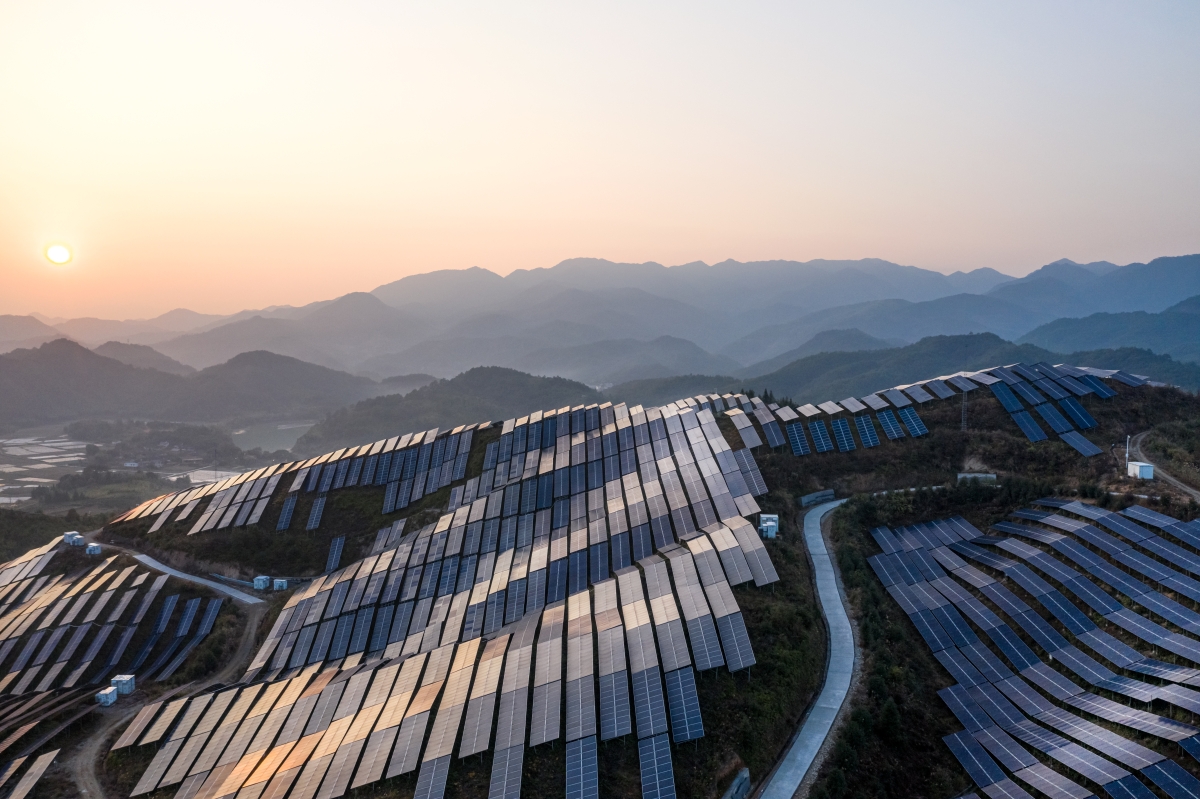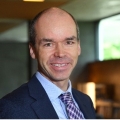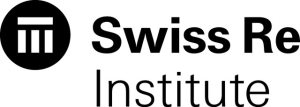Speeding Up the Energy Transition
Asia Sustainability Dialogue 2023

ZURICH, August 31, 2023 – Fossil fuels still dominate global energy consumption, accounting for 87% of Asia Pacific's needs, 70% of the EU's, and 47% of Switzerland's. To limit global warming to 1.5 degrees by 2050, a swift transition to renewable energy is essential. At the inaugural Asia Sustainability Dialogue, organized by Asia Society Switzerland and the Swiss Re Institute, experts from Europe and Asia addressed accelerating this energy transition.
Videos of all keynote presentations and the panel discussion are available below. The event was moderated by Isabelle Zheng. Here are our key takeaways:
Fossil Fuel Subsidies Skew the Clean Energy Market
- Current spending remains heavily fossil-fuel focused, contradicting climate goals.
- In 2022, G20 countries allocated USD 1 trillion to fossil fuel subsidies versus USD 265 billion for green energy.
- Such subsidies make investment in fossil fuels artificially cheaper, distorting clean energy market dynamics.
- Investment in renewables is growing, but a sevenfold increase is needed by 2030 to stay on track and reach set climate goals.
Better Risk Assessment Boosts Renewable Investment
- Traditional financial institutions are more familiar with the risks of fossil fuel investments.
- A clearer understanding of renewable energy risks can catalyze more investments.
- Predictable procurement programs and trust fund-backed guarantees can mitigate investment risks in emerging markets, covering specific risks like a change in the rule of law, non-payment, or early termination.
Wrong Infrastructure Choices Have Long-term Consequences
- Emerging economies often choose fossil fuels for quick energy gains, but this locks them into fossil-dependent systems.
- Just Energy Transition Partnerships (JETPs) aid coal-dependent emerging economies to make the shift to renewables without hampering economic growth. They also take the position of workers in the fossil energy sector into account.
- Billions have been committed to JETPs since 2020, which are a public financing tool. This signals to the private financial sector that investments in renewables are viable.
Development Banks Play a Key Role
- Multilateral Development Banks (MDBs) like the World Bank act as original impact investors, mobilizing additional financial commitments.
- MDBs offer unique expertise and technical assistance which funding from the private sector lacks, making them invaluable for middle-income countries dealing with the energy transition.
KEYNOTE: The energy transition in Europe and Asia: Investing to make it just and equitable
Philip Gass, Lead Transitions, Energy Program, International Institute for Sustainable Development
KEYNOTE: Unlocking renewable energy markets in developing and emerging economies in Asia
Andrea Bertello, Director Country Engagement & Partnerships, RELP
KEYNOTE: Repositioning Multilateral Development Banks to support Asia’s energy transition
Chris Humphrey, Senior scientist, ETH Center for Development and Cooperation (NADEL)
PANEL DISCUSSION
featuring Martin Weymann (Swiss Re), Junice Yeo (Eco-Business), and Annisa Sekaringtias (E3G)
SPEAKERS

Philip Gass is Lead Transitions in the International Institute for Sustainable Development’s Energy program, based in Geneva. He works directly on economic approaches that promote sustainability including the green economy, circular economy, and just transitions. In Indonesia he has focused on strategies to shift from coal to renewable energy. His recent work has also focused on development of fiscal policy approaches that facilitate greenhouse gas mitigation including carbon pricing and subsidy reform. He has a background in political economy and stakeholder engagement, having worked in a legislative setting in Canada prior to joining IISD.

Andrea Bertello is Director Country Engagement & Partnerships at RELP, a Brussels-based impact-driven non-profit organization aimed at scaling up cheaper and faster renewable energy deployment at large scale in the Global South by helping governments attract investment, foster competition, lower costs of renewable energy generation and reduce greenhouse gas emissions. He has 15+ years work experience in the renewable energy and energy efficiency sectors. Before working for RELP, Andrea has worked for several businesses spanning from renewable energy project development and consultancy (in Latin America), to the development of energy, IoT and data analysis solutions and small-scale clean energy generation systems (in Europe and South East Asia). He has taught several courses on renewable energy in both Argentina and the U.S. and worked as external consultant for the European Commission on renewable energy and energy efficiency projects. Before that Andrea worked for Trinergy Ltd., a wind energy asset manager based in Dublin and New Energy Finance in London (current BNEF). Andrea holds a BA in Economics (University of Turin) and an MA in Sustainable International Development (Brandeis University).

Chris Humphrey is senior scientist at the ETH Center for Development and Cooperation (NADEL) and a senior research associate at the ODI think tank, specializing in development finance. He is the author of Financing the Future (Oxford University Press, 2022) about multilateral development banks in the 21st century, and was a member of the G20 Independent Review of Multilateral Development Bank Capital Adequacy Frameworks (2022). Dr. Humphrey combines teaching, policy-oriented research and consultancies for international organizations and governments. He has a PhD from the London School of Economics.

Martin Weymann heads the Sustainability, Emerging & Political Risk Management team at Swiss Re, responsible for coordinating the sustainability activities across the company and scanning the horizon for future risks and developments. It also contributes to the dialogue with a wide range of Swiss Re’s stakeholders such as clients, investors, governments, NGOs and the public. Martin is a member of the FSB Task Force on Climate-related Disclosures (TCFD) and a board member of the UNEP Finance Initiative Principles for Sustainable Insurance (PSI). Martin holds a MSc in environmental sciences with specialization in physics, climate and water systems from ETH Zurich.

Junice Yeo is Executive Director at Eco-Business, based in Beijing. She specialises in corporate sustainability in Asia and leads the ESG Intelligence division, which focuses on research, advisory and training on key issues such as disclosure and ratings, climate risk, sustainable finance, and carbon market developments. Junice was previously Director for Southeast Asia at global sustainability management consulting firm Corporate Citizenship. She delivers board briefings on evolving ESG issues in Asia, and regularly mentors professionals across industries on ESG integration, disclosure and strategy. Junice has two decades of private and public sector experience in China and Southeast Asia. She previously served in trade, tourism and investment functions at the Embassy of Switzerland, and Sino-Singapore Tianjin Eco-City. She has also led in global and regional brand communications efforts for the Singapore Tourism Board and at the French multinational, Danone.
Annisa Sekaringtias is a senior researcher on clean energy finance and diplomacy at climate think tank E3G. Her work focuses on overcoming barriers to scaling clean energy finance via major public finance institutions, including the multilateral development banks. She also investigates how energy transition could support development and resilience, particularly in low-and-middle income economies. Prior to that, she assisted teaching in Environmental and Resource Economics and Law at UCL and worked with international organisations on energy finance. She holds a BSc in Engineering from Institut Teknologi Bandung (ITB) and an MSc in Economics and Policy of Energy and the Environment from University College London (UCL).

Isabelle Zheng, moderator of the event, is a senior researcher at the Department of Banking and Finance at the University of Zurich (UZH) following her PhD on climate and biodiversity financial risks.
She has co-developed a climate transition risk assessment tool for large portfolios of bonds, loans and equity shares which has then been applied by several regulators and policy makers. She has also established several executive programs on the frontier topics of sustainable finance, ‘Climate Change Finance’ and ‘Biodiversity and Finance’ at UZH. She holds an MA in VWL (Economics) from UZH after her bachelor from Fudan University in Shanghai. Isabelle is an alumna of the Gen A Young Leadership Program of Asia Society Switzerland.
About the Asia Sustainability Dialogue
The Asia Sustainability Dialogue is an annual event organized by Asia Society Switzerland and Swiss Re Institute. It provides a platform for in-depth discussions on sustainable practices, environmental resilience, and green economic growth. Featuring a blend of thought leaders, policymakers, business innovators, and environmental activists from both continents, the dialogue strives to inspire responsible action and sustainable development and promote cooperation in these areas between Europe and Asia.
Organizing partner:
